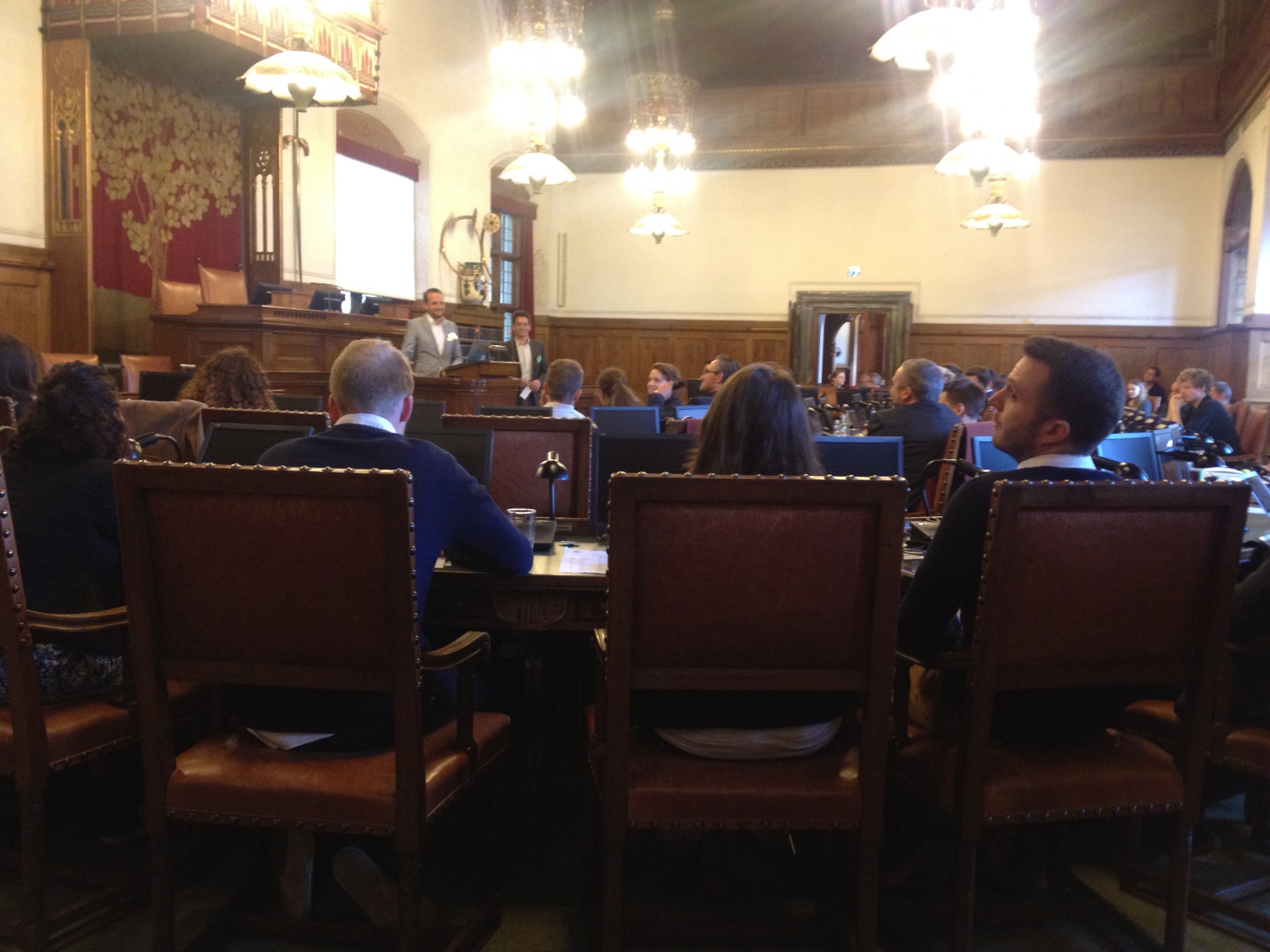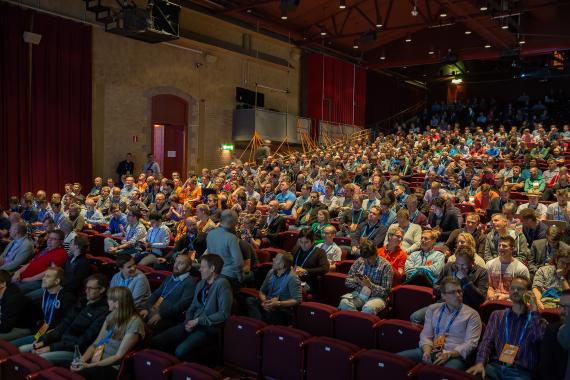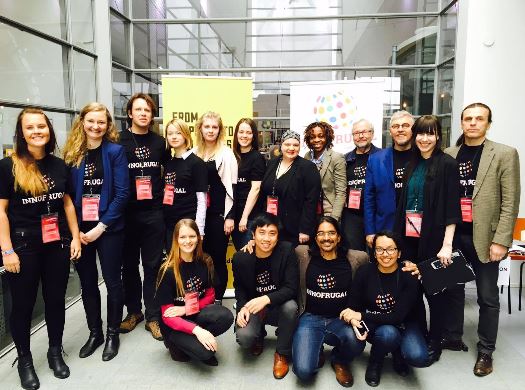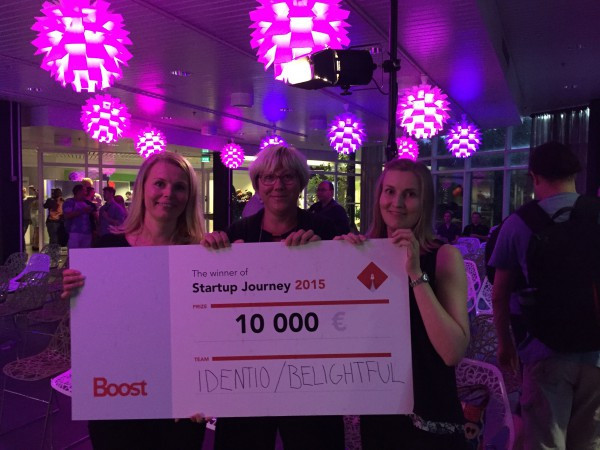Entrepreneurs present solutions to Copenhagen climate challenges

People from all over Europe gathered for last week’s Open Innovation Challenge Call at the Copenhagen city hall, where companies and startups bid to solve climate challenges faced by the city.
Together with Climate-KIC (Climate Knowledge and Innovation Community), the City of Copenhagen hosted an Open Challenge Innovation Call, which took place last Friday, the 2nd of October.
DTU Lyngby Campus inaugurated a center for climate and innovation in the Nordics on the 7th of February, 2014, Climate-KIC Nordic. This is a Scandinavian platform for innovation that addresses climate change and the challenges it brings. Climate-KIC is a European initiative that was started by the European Institute of Innovation and Technology (EIT) in 2009.
Solutions must reduce Danish greenhouse gas emissions by 40 percent
Last week’s event was just at the behest of Climate-KIC, which hosts an accelerator for clean-tech entrepreneurs who focus especially on supporting actions in the fight against climate change.
Solution proposals from participants had to to help Denmark reduce greenhouse gases by 40 percent in 2025 compared to 1990 levels.
The five defined areas of focus for climate challenges in Copenhagen were:
- Flooding of the city
- Flooding of private dwellings
- Buildings
- Smart city
- Urban heat wave
You can find a more detailed description of the challenges here.
On the initiative of the municipality and Climate-KIC, 15 companies and startups went up on stage to present their suggestions to resolve Copenhagen’s climate challenges.
Carsten Riis, director of Technology and Environmental Administration, Copenhagen, opened the afternoon’s presentations. According to him, it is important that partnerships in Copenhagen serve two purposes: firstly, partnerships should stimulate growth, jobs, and new solutions. Second, the proposed solutions should support innovation.
Meshcrafts want to improve charging infrastructure for electric cars
Among the presentations was Åsmund Møll Frengstad from Norway. He is the founder behind the company Meshcrafts, created in the summer of 2014. He was trained as a mechanical engineer in the spring of 2014. Before the founding of Meshcrafts, Åsmund also founded the company Smart Charge AS, which developed smart charge and targeted charging of electric cars.
The Norwegian startup Meshcrafts see a challenge in that there are now many gas stations, but few charging stations for electric cars. Åsmund Frengstad explains that many people with electric cars have to travel a long time between charging stations, which is cumbersome and time-consuming.
Therefore, Meshcrafts wants to improve the infrastructure for charging stations so that loading and payment processes for electric car owners are simplified. Today, they develop a peer-to-peer app that collects different types of data.
Åsmund Frengstad explains that Meshcrafts combines a variety of data, based on the preferences of electric car owners.
“We have various databases for chargers, vehicles, and users. We also have “real-time data”, such as weather and traffic. This data is combined and put into an algorithm that is based on user preference. With this data, we can guide the user regarding when it is best to charge the electric car up to get to their destination as quickly as possible,”says Åsmund Frengstad. He points out that Meshcraft wants to help the owners of charging stations to build infrastructure that makes it easier for electric car owners to charge and pay.
“It’s all those who own a charging station; we want to help to build an infrastructure that enables electric car owners to behave in a greener way, because it is likely to contribute to lower CO2 emissions. “
Mobile data will make it more attractive to launch projects in the transport sector
South Pole Group also came forward with a bid to solve the Copenhagen climate challenges. The company was founded in 2006 by five founding members. The five founders each had a vision of solving climate change, and they decided to get together and form the South Pole Carbon. In 2015, the South Pole Carbon became the South Pole Group. Today, the company has 130 employees with 60 offices worldwide, and has solved the climate challenges around the world through it’s projects.
Denis Jorisch started in the South Pole Group in January and is a consultant. He says that the South Pole want to use mobile data to monitor traffic in cities more accurately than they do today.
“Today, traffic is measured with very basic measurements, for example, passenger surveys. The studies are costly and not very accurate. What we are trying to do is to create a new method of measurement that is not as crude a method to indicate the data more accurately. “
In order to access the desired data, the South Pole is in cooperation with telecommunications companies, and Denis Jorisch elaborates that the same type of data found in other industries.
“You are already using the same kinds of data for many different things. If you want to open a new store, for example Zara, you must include find out where it’s best to open a new store. You will use the data to find out what people passing by 3where and who they are, for example, old/young/women/men. This type of the data is not new in itself. What is new is to calculate CO2 emissions in cities through mobile data. It is a new approach. “
The purpose of the data method does not reduce CO2 emissions or save energy. The aim is to save people money, explains Denis. Money savings should hopefully encourage more neighboring companies to start projects in the transport sector.
“Today it is very expensive to do projects involving releases of carbon in transport, because monitoring is expensive. So there is a very long ROI (Return on Investment), which may take 10-20 years, and is not in companies’ interest. Therefore, through our systems, we can help more projects in the transport sector to be initiated,” says Denis Jorisch, explaining:
“Our idea is not to reduce CO2 with our measurement system, but to allow other people to make projects that reduce CO2 emissions.”
Nordic Innovation Center at DTU is part of the Climate-KIC
Climate-KIC offers various programs to help startups to grow and spread. Startups can enroll in the Climate-KIC accelerator program, which focuses on cleantech commercialization. Here, entrepreneurs get tools, techniques, and intensive counseling to boost their business.
Climate-KIC also holds venture competitions,where the most promising startups around the world pitch their business ideas to a jury of experienced entrepreneurs, investors, and business people. Entrepreneurs can also help get their businesses up and running by utilizing Climate-KIC’s incubator partners and thereby get work, coaching, and networking access.
The center will work with innovation, education, and entrepreneurship, and is the first KIC center in Denmark. The Nordic center aims to help strengthen Danish and Nordic developments within climate innovation. It is a collaborative project between the University of Copenhagen, Chalmers University of Technology, Grundfos, and the VELUX Group.
The Climate-KIC accelerator program currently supports 150 startups in Europe.







